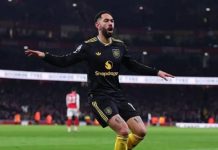Africa-Press – Eritrea. The International Criminal Court’s chief prosecutor has lost access to his email, and his bank accounts have been frozen.
The Hague-based court’s American staffers have been told that if they travel to the U.S. they risk arrest.
Some nongovernmental organizations have stopped working with the ICC and the leaders of one won’t even reply to emails from court officials.
Those are just some of the hurdles facing court staff since U.S. President Donald Trump in February slapped sanctions on its chief prosecutor, Karim Khan, according to interviews with current and former ICC officials, international lawyers and human rights advocates.
The sanctions will “prevent victims from getting access to justice,” said Liz Evenson, international justice director at Human Rights Watch.
Trump sanctioned the court after a panel of ICC judges in November issued arrest warrants for Israeli Prime Minister Benjamin Netanyahu and his former defense minister, Yoav Gallant.
Judges found there was reason to believe that the pair may have committed war crimes by restricting humanitarian aid and intentionally targeting civilians in Israel’s war on Gaza.
Staffers and allies of the ICC said the sanctions have made it increasingly difficult for the tribunal to conduct basic tasks, let alone seek justice for victims of war crimes or genocide.
A spokesperson for the ICC and for Khan declined to comment. In February, ICC President Judge Tomoko Akane said that the sanctions “constitute serious attacks against the Court’s States Parties, the rule of law based international order and millions of victims.”
Order targets chief prosecutor
The February order bans Khan and other non-Americans among the ICC’s 900 staff members from entering the U.S., which is not a member of the court. It also threatens any person, institution or company with fines and prison time if they provide Khan with “financial, material, or technological support.”
The sanctions are hampering work on a broad array of investigations, not just the one into Israel’s leaders.
The ICC had been investigating atrocities in Sudan and had issued arrest warrants for former Sudanese President Omar al-Bashir on charges that include genocide. That probe has ground to a halt even as reports mount of new atrocities in Sudan, according to an attorney representing ICC prosecutor Eric Iverson, who is fighting the sanctions in U.S. courts. Iverson filed a federal lawsuit against the Trump administration seeking protection from the sanctions.
Iverson “cannot do, what I would describe as, basic lawyer functions,” said Allison Miller, who is representing Iverson in the suit.
American staffers at the organization, like Iverson, have been warned by its attorneys that they risk arrest if they return home to visit family, according to ICC officials. Six senior officials have left the court over concerns about sanctions.
One reason the the court has been hamstrung is that it relies heavily on contractors and non-governmental organizations. Those businesses and groups have curtailed work on behalf of the court because they were concerned about being targeted by U.S. authorities, according to current and former ICC staffers.
Microsoft, for example, cancelled Khan’s email address, forcing the prosecutor to move to Proton Mail, a Swiss email provider, ICC staffers said. His bank accounts in his home country of the U.K. have been blocked.
Microsoft did not respond to a request for comment.
Staffers at an NGO that plays an integral role in the court’s efforts to gather evidence and find witnesses said the group has transferred money out of U.S. bank accounts because they fear it might be seized by the Trump administration.
Senior leadership at two other U.S.-based human rights organizations told the AP that their groups have stopped working with the ICC. A senior staffer at one told the AP that employees have stopped replying to emails from court officials out of fear of triggering a response from the Trump administration.
The cumulative effect of such actions has led ICC staffers to openly wonder whether the organization can survive the Trump administration, according to ICC officials who spoke on condition of anonymity out of fear of reprisal.
One questioned whether the court would make it through the next four years.
For More News And Analysis About Eritrea Follow Africa-Press







